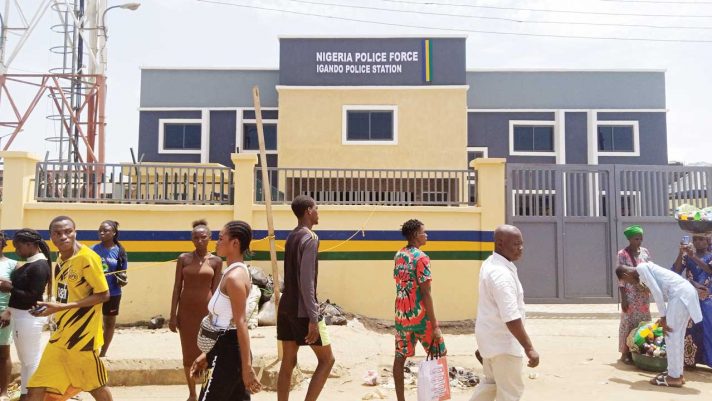By Editor
• IGP to commission 20 new stations • Ensure justice for Lekki tollgate victims’, says Right Watch
Lagos residents have applauded the renovation of 20 police stations set ablaze by hoodlums during the EndSARS protest against police brutality in October 2020.
Some of these stations were vacated after the incident, while operations in others were carried out under canopies provided by individuals and Police Community Relations Committees (PCRC).
The affected police stations are in Orile, Amukoko, Layeni, Ilasamaja, Ikotun, Ajah, Igando, Elemoro, Makinde, Onipanu, Ebute-Ero, Pen Cinema, Isokoko and Alade.
Others are: Cele, Igbo-Elerin, Shibiri, Gbagada, Onilekere, Makoko, Daleko, Asahun, Makinyo, Amuwo-Odofin and the Anti-Kidnapping Station at Charley Boy Bus Stop.
For instance, in Makinde Police Station, where the police barracks and some cells were burnt, the DPO attends to cases under the tree, while suspects are handcuffed and watched very closely under the same tree.
The stations, which are 90 per cent completed, according to a police source, would be commissioned by the Inspector General of Police (IGP) Usman Alkali Baba and handed over to their respective Divisional Police Officers (DPOs).
That unlike the previous designs, the restored structures are constructed in a house format, with Closed-Circuit Television (CCTV) cameras and video recording technology installed to prevent human rights abuses.
Also, the colour across the state has improved with light grey, cream and its traditional green, yellow and navy line with a black see-through black gate.
Some residents, who spoke to The Guardian, on the new development, applauded the Federal Government for the feat, stressing that it would further increase police presence in various communities.
A resident, Alhaja Abosede Adebayo said: “When they burn this place in 2020, we did not see police officers here to do anything. “For five months, if you come here, you will not know there was a police post here at all. This new building would bring them comfort because I heard that air conditioners have already been fitted.”
Another resident, Jeremiah Ogunde, noted that during the riot, arms and ammunition were carted away and some detainees freed at Ajiwe Police Station in Ajah.
He stressed that after the incident, it has been hard for officers because they were operating under a tree and it was not easy accessing them.
“We had to contribute money to buy them canopies, chairs and vans for smooth operations. But this development will give them confidence in doing their work, ” he said.
For Mr. Fadeyi James, the new building will improve police operations in the state, while suspects will also enjoy the improved amenities.
“The way the cells were before was hell. I have been there. So, I know what I am saying, especially the one here in Igando. It is dirty with broken walls and concrete, and the worst place to defecate. At least, before it gets old, suspects will still enjoy the facilities a little while,” he added.
MEANWHILE, Human Rights Watch has called on the Nigeria authorities to ensure justice for protesters allegedly killed in Lekki tollgate in 2020.
The group in a statement, tagged: “Prioritise Justice for Abuses Against Protesters”, urged the authorities to act on the panel’s recommendations and hold those responsible to account.
According to the group, the report of the judicial panel of inquiry should not be swept under the carpet without any consequences for those responsible for killing and injuring protesters.
“Nigeria has a poor history with judicial panels of inquiries, whose recommendations have no force of law and are often dependent on the responsible authorities to carry out the recommendations.
“ Lack of political will on justice and accountability meant that past judicial panels, including those set up to investigate mass extrajudicial killings in other contexts made no progress toward ending impunity for security force abuses,” the statement said.

